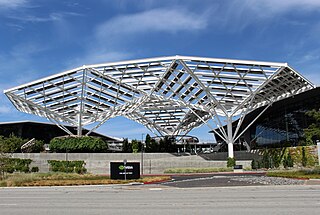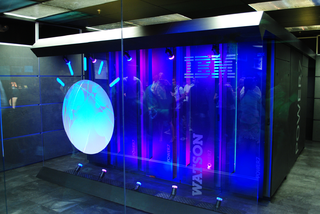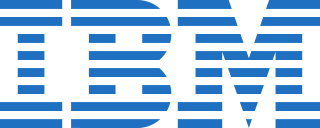
The USC Information Sciences Institute (ISI) is a component of the University of Southern California (USC) Viterbi School of Engineering, and specializes in research and development in information processing, computing, and communications technologies. It is located in Marina del Rey, California.

A mainframe computer, informally called a mainframe or big iron, is a computer used primarily by large organizations for critical applications like bulk data processing for tasks such as censuses, industry and consumer statistics, enterprise resource planning, and large-scale transaction processing. A mainframe computer is large but not as large as a supercomputer and has more processing power than some other classes of computers, such as minicomputers, servers, workstations, and personal computers. Most large-scale computer-system architectures were established in the 1960s, but they continue to evolve. Mainframe computers are often used as servers.

Nvidia Corporation is an American multinational technology company incorporated in Delaware and based in Santa Clara, California. It is a software and fabless company which designs graphics processing units (GPUs), application programming interface (APIs) for data science and high-performance computing as well as system on a chip units (SoCs) for the mobile computing and automotive market. Nvidia is a dominant supplier of artificial intelligence hardware and software. Its professional line of GPUs are used in workstations for applications in such fields as architecture, engineering and construction, media and entertainment, automotive, scientific research, and manufacturing design.

Fujitsu Limited is a Japanese multinational information and communications technology equipment and services corporation, established in 1935 and headquartered in Tokyo. It is the world's sixth-largest IT services provider by annual revenue, and the largest in Japan, in 2021. The hardware offerings from Fujitsu are mainly of personal and enterprise computing products, including x86, SPARC and mainframe compatible server products, although the corporation and its subsidiaries also offer a diversity of products and services in the areas of data storage, telecommunications, advanced microelectronics, and air conditioning. It has approximately 126,400 employees and its products and services are available in approximately 180 countries.

Gene Myron Amdahl was an American computer architect and high-tech entrepreneur, chiefly known for his work on mainframe computers at IBM and later his own companies, especially Amdahl Corporation. He formulated Amdahl's law, which states a fundamental limitation of parallel computing.
Quantum programming is the process of designing or assembling sequences of instructions, called quantum circuits, using gates, switches, and operators to manipulate a quantum system for a desired outcome or results of a given experiment. Quantum circuit algorithms can be implemented on integrated circuits, conducted with instrumentation, or written in a programming language for use with a quantum computer or a quantum processor.
Microsoft Research (MSR) is the research subsidiary of Microsoft. It was created in 1991 by Richard Rashid, Bill Gates and Nathan Myhrvold with the intent to advance state-of-the-art computing and solve difficult world problems through technological innovation in collaboration with academic, government, and industry researchers. The Microsoft Research team has more than 1,000 computer scientists, physicists, engineers, and mathematicians, including Turing Award winners, Fields Medal winners, MacArthur Fellows, and Dijkstra Prize winners.

D-Wave Quantum Systems Inc. is a Canadian quantum computing company, based in Burnaby, British Columbia. D-Wave claims to be the world's first company to sell computers that exploit quantum effects in their operation. D-Wave's early customers include Lockheed Martin, University of Southern California, Google/NASA and Los Alamos National Lab.
Dynamic Infrastructure is an information technology concept related to the design of data centers, whereby the underlying hardware and software can respond dynamically and more efficiently to changing levels of demand. In other words, data center assets such as storage and processing power can be provisioned to meet surges in user's needs. The concept has also been referred to as Infrastructure 2.0 and Next Generation Data Center.

IBM Watson is a computer system capable of answering questions posed in natural language. It was developed in IBM's DeepQA project by a research team led by principal investigator David Ferrucci. Watson was named after IBM's founder and first CEO, industrialist Thomas J. Watson.
D-Wave Two is the second commercially available quantum computer, and the successor to the first commercially available quantum computer, D-Wave One. Both computers were developed by Canadian company D-Wave Systems. The computers are not general purpose, but rather are designed for quantum annealing. Specifically, the computers are designed to use quantum annealing to solve a single type of problem known as quadratic unconstrained binary optimization. As of 2015, it was still debated whether large-scale entanglement takes place in D-Wave Two, and whether current or future generations of D-Wave computers will have any advantage over classical computers.

The International Business Machines Corporation, nicknamed Big Blue, is an American multinational technology corporation headquartered in Armonk, New York and is present in over 175 countries. It specializes in computer hardware, middleware, and software, and provides hosting and consulting services in areas ranging from mainframe computers to nanotechnology. IBM is the largest industrial research organization in the world, with 19 research facilities across a dozen countries, and held the record for most annual U.S. patents generated by a business for 29 consecutive years from 1993 to 2021.
QxBranch, Inc. (QxBranch) is a data analysis and quantum computing software company, based in Washington, D.C. The company provides data analytics services and research and development for quantum computing technology. On July 11, 2019, QxBranch announced that it had been acquired by Rigetti Computing, a developer of quantum integrated circuits used for quantum computers.
Cloud-based quantum computing is the invocation of quantum emulators, simulators or processors through the cloud. Increasingly, cloud services are being looked on as the method for providing access to quantum processing. Quantum computers achieve their massive computing power by initiating quantum physics into processing power and when users are allowed access to these quantum-powered computers through the internet it is known as quantum computing within the cloud.

Rigetti Computing, Inc. is a Berkeley, California-based developer of quantum integrated circuits used for quantum computers. The company also develops a cloud platform called Forest that enables programmers to write quantum algorithms.

Qiskit is an open-source software development kit (SDK) for working with quantum computers at the level of circuits, pulses, and algorithms. It provides tools for creating and manipulating quantum programs and running them on prototype quantum devices on IBM Quantum Platform or on simulators on a local computer. It follows the circuit model for universal quantum computation, and can be used for any quantum hardware that follows this model.
Quantinuum is a quantum computing company formed by the merger of Cambridge Quantum and Honeywell Quantum Solutions. The company's H-Series trapped ion quantum computers set the highest quantum volume to date of 524,288. This architecture supports all-to-all qubit connectivity - allowing entangled states to be created between all qubits – and enables a high fidelity of quantum states.
QC Ware is a quantum-computing-as-a-service company based in Palo Alto, California.

Merative L.P., formerly IBM Watson Health, is an American medical technology company that provides products and services that help clients facilitate medical research, clinical research, real world evidence, and healthcare services, through the use of artificial intelligence, data analytics, cloud computing, and other advanced information technology. Merative is owned by Francisco Partners, an American private equity firm headquartered in San Francisco, California. In 2022, IBM divested and spun-off their Watson Health division into Merative. As of 2023, it remains a standalone company headquartered in Ann Arbor with innovation centers in Hyderabad, Bengaluru, and Chennai.











